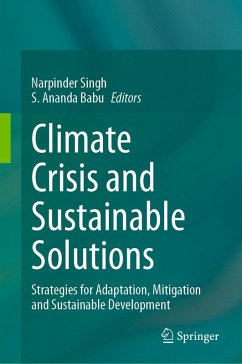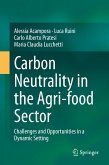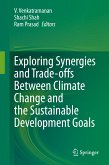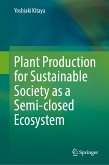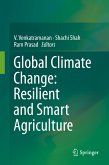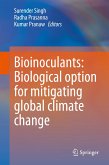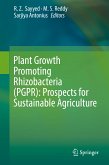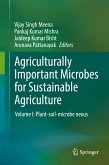Climate Crisis and Sustainable Solutions (eBook, PDF)
Strategies for Adaptation, Mitigation and Sustainable Development
Redaktion: Singh, Narpinder; Babu, S. Ananda


Alle Infos zum eBook verschenken

Climate Crisis and Sustainable Solutions (eBook, PDF)
Strategies for Adaptation, Mitigation and Sustainable Development
Redaktion: Singh, Narpinder; Babu, S. Ananda
- Format: PDF
- Merkliste
- Auf die Merkliste
- Bewerten Bewerten
- Teilen
- Produkt teilen
- Produkterinnerung
- Produkterinnerung

Hier können Sie sich einloggen

Bitte loggen Sie sich zunächst in Ihr Kundenkonto ein oder registrieren Sie sich bei bücher.de, um das eBook-Abo tolino select nutzen zu können.
This contributed volume dives into the critical intersection of climate adaptation, vulnerability to hazards, and the imperative of decarbonization in fortifying global food and nutritional security. This comprehensive exploration aims to shed light on the challenges our food systems face in the wake of climate change, and the strategies required to ensure resilience and sustainability.
In the face of escalating climate challenges, securing sustenance demands a comprehensive approach. Climate adaptation becomes paramount, as agricultural systems struggle with increased vulnerabilities to…mehr
- Geräte: PC
- ohne Kopierschutz
- eBook Hilfe
- Größe: 33.19MB
![Carbon Neutrality in the Agri-food Sector (eBook, PDF) Carbon Neutrality in the Agri-food Sector (eBook, PDF)]() Alessia AcamporaCarbon Neutrality in the Agri-food Sector (eBook, PDF)97,95 €
Alessia AcamporaCarbon Neutrality in the Agri-food Sector (eBook, PDF)97,95 €![Exploring Synergies and Trade-offs between Climate Change and the Sustainable Development Goals (eBook, PDF) Exploring Synergies and Trade-offs between Climate Change and the Sustainable Development Goals (eBook, PDF)]() Exploring Synergies and Trade-offs between Climate Change and the Sustainable Development Goals (eBook, PDF)113,95 €
Exploring Synergies and Trade-offs between Climate Change and the Sustainable Development Goals (eBook, PDF)113,95 €![Plant Production for Sustainable Society as a Semi-closed Ecosystem (eBook, PDF) Plant Production for Sustainable Society as a Semi-closed Ecosystem (eBook, PDF)]() Yoshiaki KitayaPlant Production for Sustainable Society as a Semi-closed Ecosystem (eBook, PDF)121,95 €
Yoshiaki KitayaPlant Production for Sustainable Society as a Semi-closed Ecosystem (eBook, PDF)121,95 €![Global Climate Change: Resilient and Smart Agriculture (eBook, PDF) Global Climate Change: Resilient and Smart Agriculture (eBook, PDF)]() Global Climate Change: Resilient and Smart Agriculture (eBook, PDF)137,95 €
Global Climate Change: Resilient and Smart Agriculture (eBook, PDF)137,95 €![Bioinoculants: Biological Option for Mitigating global Climate Change (eBook, PDF) Bioinoculants: Biological Option for Mitigating global Climate Change (eBook, PDF)]() Bioinoculants: Biological Option for Mitigating global Climate Change (eBook, PDF)161,95 €
Bioinoculants: Biological Option for Mitigating global Climate Change (eBook, PDF)161,95 €![Plant Growth Promoting Rhizobacteria (PGPR): Prospects for Sustainable Agriculture (eBook, PDF) Plant Growth Promoting Rhizobacteria (PGPR): Prospects for Sustainable Agriculture (eBook, PDF)]() Plant Growth Promoting Rhizobacteria (PGPR): Prospects for Sustainable Agriculture (eBook, PDF)113,95 €
Plant Growth Promoting Rhizobacteria (PGPR): Prospects for Sustainable Agriculture (eBook, PDF)113,95 €![Agriculturally Important Microbes for Sustainable Agriculture (eBook, PDF) Agriculturally Important Microbes for Sustainable Agriculture (eBook, PDF)]() Agriculturally Important Microbes for Sustainable Agriculture (eBook, PDF)113,95 €
Agriculturally Important Microbes for Sustainable Agriculture (eBook, PDF)113,95 €-
-
-
In the face of escalating climate challenges, securing sustenance demands a comprehensive approach. Climate adaptation becomes paramount, as agricultural systems struggle with increased vulnerabilities to various hazards. From extreme weather events to shifting precipitation patterns, the agricultural landscape is under constant threat. The decarbonization imperative emerges as a critical strategy, addressing the dual goals of mitigating climate change and enhancing food and nutritional resilience. By reducing carbon emissions and transitioning to sustainable practices, we not only contribute to global climate goals but also fortify food systems against environmental shocks. This integrated approach acknowledges the intricate connections between climate, agriculture, and nutrition, emphasizing the urgency of concerted efforts to ensure a resilient and sustainable future for food production and consumption. This book includes in-depth case studies from different regions, showcasing the diverse impacts of climate change on food systems.
This book will integrate insights from multiple disciplines such as environmental science, agriculture, policy studies, and community engagement, providing a more holistic understanding of the issues at hand. It will serve as a valuable resource for students, researchers and practitioners seeking in-depth knowledge on these interconnected topics.
Dieser Download kann aus rechtlichen Gründen nur mit Rechnungsadresse in A, B, BG, CY, CZ, D, DK, EW, E, FIN, F, GR, HR, H, IRL, I, LT, L, LR, M, NL, PL, P, R, S, SLO, SK ausgeliefert werden.
- Produktdetails
- Verlag: Springer Nature Singapore
- Seitenzahl: 356
- Erscheinungstermin: 26. November 2024
- Englisch
- ISBN-13: 9789819771103
- Artikelnr.: 72252897
- Verlag: Springer Nature Singapore
- Seitenzahl: 356
- Erscheinungstermin: 26. November 2024
- Englisch
- ISBN-13: 9789819771103
- Artikelnr.: 72252897
- Herstellerkennzeichnung Die Herstellerinformationen sind derzeit nicht verfügbar.
.- Chapter 1_Assessing the Global Impacts of Climate Change on Food and Nutritional Security: Essential Strategies for Mitigation.
.- Chapter 2_Decadal Changes in Glacier of Alaknanda Basin Uttarakhand Under Warming Climate.
.- Chapter 3_Climate Chaos: Navigating the Dual Challenge Faced by Migrant Workers in Bengaluru, India.
.- Chapter 4_Effects of Algal Biodiesel- Petro-Diesel Blends in Emission from IC Engine
.- Chapter 5_Impact of drought stress in different grains & approach to alleviate its effect.
2. Disaster Management and Preparedness:
.- Chapter 6_The Interplay of Fossil Fuels and Natural Disasters.
.- Chapter 7_Fire Hotspot and Aerosol Climatology Observation over South Asia Using Satellite Data.
.- Chapter 8_Mapping and Monitoring of Asan Watershed using Geospatial Technology.
.- Chapter 9_Drought Vulnerability Assessment of Farming Communities in the North Central Province of Sri Lanka: A Community Capital Framework Analysis.
.- Chapter 10_Quantifying Glacier Retreat and Elevated Lake Growth Using Remote Sensing for Disaster Management in Western Himalaya.
.- Chapter 11_Exploring the Role of Physiotherapists' in Disaster Management.
3. Environmental Pollution and Air and Water Quality:
.- Chapter 12_Identification of Upwind Source Regions Responsible for Pollution Episodes over New Delhi during Pre and Post Monsoon Season.
.- Chapter 13_Air quality dynamic in North India.
.- Chapter 14_Factor Militating Against Solid Waste Management in Africa.
.- Chapter 15_Assessment of Ozone Pollution in the Foothills of Central Himalayan Valley.
4. Sustainable Development Goals and Policies, Ecological Impact and Conservation, Water Resources and Agriculture:
.- Chapter 16_Perceptions of Climate Change and Its Impacts on Local Communities along the Noakhali Coast in Bangladesh.
.- Chapter 17_HVDC Submarine Cable: A Perspective towards Accomplishing UN's SDG Goals for Our Indian Marine Ecology.
.- Chapter 18_The Impact of Climate Change in the Eastern Himalayan State of Sikkim, India: A Review.
.- Chapter 19_Climate Change and Natural Disasters: Navigating A Legal Response.
.- Chapter 20_Evaluation of Emerging Contaminants (ECs) in Water Resources, Spatio-Temporal Assessment and Environment-friendly Remedies: An Indian Perspective.
.- Chapter 21_Techniques of Bioremediation for Polluted Environments: Overview,Benefits, Drawbacks, and Future Prospects.
.- Chapter 22_Himalyan Chir Pine Biomass as Adsobent for Removal of Industrial Dye.
.- Chapter 1_Assessing the Global Impacts of Climate Change on Food and Nutritional Security: Essential Strategies for Mitigation.
.- Chapter 2_Decadal Changes in Glacier of Alaknanda Basin Uttarakhand Under Warming Climate.
.- Chapter 3_Climate Chaos: Navigating the Dual Challenge Faced by Migrant Workers in Bengaluru, India.
.- Chapter 4_Effects of Algal Biodiesel- Petro-Diesel Blends in Emission from IC Engine
.- Chapter 5_Impact of drought stress in different grains & approach to alleviate its effect.
2. Disaster Management and Preparedness:
.- Chapter 6_The Interplay of Fossil Fuels and Natural Disasters.
.- Chapter 7_Fire Hotspot and Aerosol Climatology Observation over South Asia Using Satellite Data.
.- Chapter 8_Mapping and Monitoring of Asan Watershed using Geospatial Technology.
.- Chapter 9_Drought Vulnerability Assessment of Farming Communities in the North Central Province of Sri Lanka: A Community Capital Framework Analysis.
.- Chapter 10_Quantifying Glacier Retreat and Elevated Lake Growth Using Remote Sensing for Disaster Management in Western Himalaya.
.- Chapter 11_Exploring the Role of Physiotherapists' in Disaster Management.
3. Environmental Pollution and Air and Water Quality:
.- Chapter 12_Identification of Upwind Source Regions Responsible for Pollution Episodes over New Delhi during Pre and Post Monsoon Season.
.- Chapter 13_Air quality dynamic in North India.
.- Chapter 14_Factor Militating Against Solid Waste Management in Africa.
.- Chapter 15_Assessment of Ozone Pollution in the Foothills of Central Himalayan Valley.
4. Sustainable Development Goals and Policies, Ecological Impact and Conservation, Water Resources and Agriculture:
.- Chapter 16_Perceptions of Climate Change and Its Impacts on Local Communities along the Noakhali Coast in Bangladesh.
.- Chapter 17_HVDC Submarine Cable: A Perspective towards Accomplishing UN's SDG Goals for Our Indian Marine Ecology.
.- Chapter 18_The Impact of Climate Change in the Eastern Himalayan State of Sikkim, India: A Review.
.- Chapter 19_Climate Change and Natural Disasters: Navigating A Legal Response.
.- Chapter 20_Evaluation of Emerging Contaminants (ECs) in Water Resources, Spatio-Temporal Assessment and Environment-friendly Remedies: An Indian Perspective.
.- Chapter 21_Techniques of Bioremediation for Polluted Environments: Overview,Benefits, Drawbacks, and Future Prospects.
.- Chapter 22_Himalyan Chir Pine Biomass as Adsobent for Removal of Industrial Dye.
